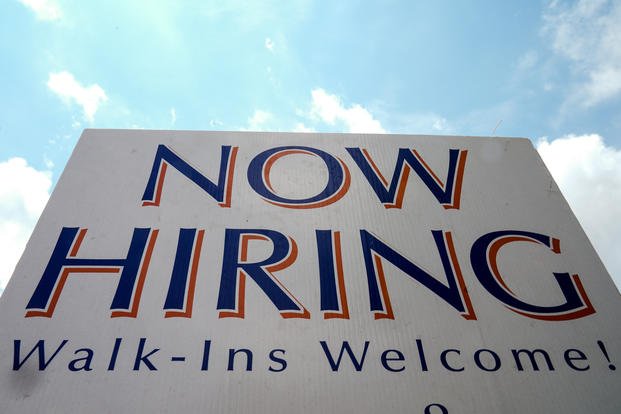The unemployment rate for post-9/11 veterans dropped a full percentage point from 3.8% in January to 2.8% in February as the resilient U.S. economy added 311,000 jobs, while possibly setting the stage for a new round of job-killing interest rate hikes from the Federal Reserve.
In the latest of a string of positive jobs reports, the Bureau of Labor Statistics' monthly report for February, released Friday, showed that the unemployment rate for all veterans ticked down from 2.8% in January to 2.5% in February. The jobless rate for all U.S. workers in February was 3.6%, up from 3.4% in January, which was the lowest rate since 1969.
In a statement on the BLS report, outgoing Labor Secretary Marty Walsh said that job growth in February "was especially strong in the leisure and hospitality sector, as restaurants and bars added jobs; in retail trade; and in health care, where hospitals and nursing homes added significant numbers of jobs."
Read Next: Beards in the Military Don't Help with 'Kicking the Enemy's Ass,' Top Enlisted Adviser Says
"The unemployment rate has now been under four percent for a full year, and in February, for the first time, labor force participation for adults between the ages of 25-54 is higher than it was before the pandemic," said Walsh, who is leaving the administration to become head of the National Hockey League Players' Association.
The 311,000 jobs added in February exceeded market expectations that the job growth would be in the range of 200,000 and also put a focus on how Federal Reserve Chairman Jerome Powell would respond in his long-term effort to bring down inflation and cool off a robust economy that has added more than a million jobs over the last three months.
In congressional testimony earlier this week, Powell seemed adamant that a new round of interest rate hikes would be coming when the Fed's Open Market Committee meets in two weeks, but Robert Frick, corporate economist at Navy Federal Credit Union, said that other data in the BLS report could lead Powell to reconsider.
There were signs that wage growth was slowing, which could make the Fed "less likely to do dramatic rate increases," Frick said, and the latest BLS report should not be seen as a "call to action for the Fed to do one thing or another."
The inflation rate has already fallen from a peak of 9.1% in June to 6.4% in January, but Powell said in House and Senate testimony this week that he would not shy away from aggressive interest rate hikes to get the inflation rate down to 2%.
His stance led to a confrontation Tuesday before the Senate Banking Committee with Sen. Elizabeth Warren, D-Mass., who charged that Powell's only plan for bringing down inflation and cooling off the economy was to "throw people out of work."
Warren said the Fed's own projection is that the unemployment rate will rise to 4.6% by the end of this year, meaning about two million workers would lose their jobs. She asked Powell how he would explain that to the two million people "you're planning to get fired over the next year."
Powell responded that "I would explain to people more broadly that inflation is extremely high and it's hurting the working people of this country badly -- all of them, not just two million of them but all of them are suffering under high inflation, and we are taking the only measures we have to bring inflation down."
Powell added, "The latest economic data have come in stronger than expected, which suggests that the ultimate level of interest rates is likely to be higher than previously anticipated."
He said that "if the totality of the data were to indicate that faster tightening is warranted, we would be prepared to increase the pace of rate hikes."
"We'll see what the Fed will do," but in the meantime, the latest BLS report is an indicator of the ongoing success of the $1.9 trillion American Rescue Plan enacted in the early days of his administration, President Joe Biden said at the White House.
He said that 12 million more Americans have jobs since he came to office, and "what pleases me most -- people who had been staying out of the job market are moving back in."
Despite the uncertainty about the way forward for the economy, veterans could be expected to outperform their civilian counterparts in the job market, as they have since the easing of the pandemic, said Eric Eversole, president of the "Hiring Our Heroes" program at the U.S. Chamber of Commerce.
"A lot of that has to do with the companies of this country valuing" the qualities of resiliency and adaptability that veterans bring to the workforce, Eversole said.
-- Richard Sisk can be reached at Richard.Sisk@Military.com.
Related: Disabled Vets Post Stunning Job Gains as Economy Remains Hot Despite Inflation











